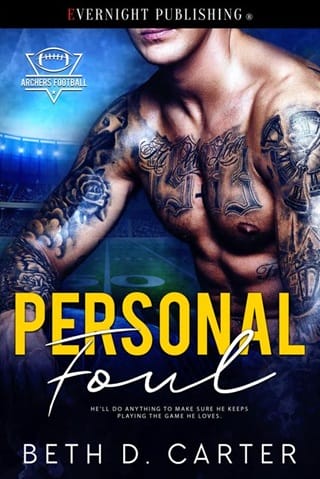Chapter Twenty-Nine
TWENTY-NINE
SEPTEMBER 1987
“What are you wearing to your party?” asked Shirley. She and Augusta were sharing a turkey club with an extra side of pickles from the snack bar. The weather had cooled overnight and both women wore sweatshirts over their swimsuits. Augusta let Shirley have the last potato chip.
“It isn’t a party,” Augusta told her. “We’re going out to dinner, that’s all.”
“Dinner to celebrate your eightieth birthday. Sounds a lot like a party to me.”
“What does it matter what I wear? Who’s going to be looking at me?”
Shirley almost choked on her chip. “Who’s going to be—Jesus, Augusta, you invited two men who have literally been fighting over you for weeks! I’d say both of them are going to be looking. Besides, at our age, we have to dress for ourselves. ”
“I’ll probably wear my black pants,” said Augusta.
Shirley pursed her lips together as if that were the saddest thing she’d ever heard. “Absolutely not,” she said.
“But why? They’re comfortable. And black is chic!”
“Tell the truth—are they your funeral pants? How many funerals have you worn them to?”
Augusta frowned. “Why does that matter?”
“It matters because it’s your birthday party! You should be wearing something to celebrate life!”
“Like what?”
“With those legs? How about a dress?”
“I don’t have any dresses.”
“Then it looks like the two of us are going shopping.”
It wasn’t strictly true that Augusta had no dresses. Of course she had a few hanging in her closet: the one she’d worn to a cousin’s wedding, the one Jackie helped her choose for her daughter’s bat mitzvah, a beaded shift that her niece had given her for a New Year’s Eve party a few years earlier. But she didn’t want to wear any of those dresses again. None of them felt like the right thing to wear on her eightieth birthday.
The next day, Augusta let Shirley drag her to department stores and boutiques all over Boca Raton. She hid her irritation and did her best to stay positive while Shirley held her hostage in various dressing rooms. But everything her friend picked out was too short, too tight, or too low-cut.
“You’re no fun, you know that?” Shirley lamented, after passing half a dozen rejected dresses back to yet another scowling saleswoman. “I don’t see what the problem is—you look great in everything!”
They were at the fifth store of the day when the latest saleswoman tapped on the dressing room door. “How about this?” she asked politely, holding up a soft pink sleeveless sheath with a flowy deconstructed jacket. It was long and loose and modest enough, without a single bead or sequin. Shirley sucked in a breath. “It’s perfect!” she gasped.
Augusta felt her pulse begin to race. “No pink,” she said briskly. “I never wear pink.” She did not say that the last time she’d worn pink, it had been the worst night of her life. She did not say that the thought of wearing it now made her feel as if she couldn’t breathe. “Actually, Shirley, I’m getting tired. I think I’m done looking for today.”
“Don’t you want to try this one first? Pink would look beautiful on you. Or maybe it comes in another color?”
Augusta leaned back against the wall and placed one hand over her chest.
“Augusta, are you feeling all right? You look like you’re about to faint.”
“I’m fine… a little dizzy, that’s all.”
The saleswoman frowned and left the dressing room. “I’ll get you a glass of water,” she called out from the other side of the door.
But Augusta didn’t stay long enough to drink the water. Once she’d gotten her shoes back on, she fled from the dressing room to the parking lot, where Shirley had to race to keep up with her.
In the car, Shirley searched for answers as she drove them back to Rallentando Springs. “Maybe your blood sugar got low,” she said. “That happens to me sometimes when I don’t eat enough. Or maybe it was those dressing room lights. Sometimes overhead lighting gives me a migraine.”
“Maybe,” said Augusta. “Next time I’ll bring a granola bar. And a pair of sunglasses. I’m feeling much better now, actually. Thank you for taking me today.”
“Of course,” Shirley said. “That’s what friends do.”
They rode in silence for a few miles before Shirley spoke again. “Augusta, if I ask you something, will you promise you won’t be upset with me?”
“I could never be upset with you.”
“You know I was married once, and that my husband died too young. But you… you’ve got so much going for you. You’re smart and beautiful. How is it that you never married?”
Augusta stared out the car window. She’d heard this question so many times, from so many people over the course of her life. When she was younger, the question made her angry. Sometimes it had driven her to despair. But now, at almost eighty years old, she had made her peace with it. “Do you really want to know?” she asked.
Shirley nodded. “I do.”
Augusta leaned back in her seat. “I’ll begin at the beginning then. When my mother died, I was fourteen years old.”
“Oh, Augusta, I’m so sorry.”
“My father never got over her death. He became more and more distant with me and my sister. At home, he hid away in his bedroom or behind the pages of his newspaper. The drugstore was the only place that he still seemed to be himself—for the most part, at least. So he threw himself into his work. He stayed at the store until all hours, day after day, year after year. He never took a vacation—he couldn’t bear to be away from the pharmacy.
“The thing was, my mother didn’t die in a car crash or in an accident or anything like that. She died of diabetes less than a year before insulin became available. Imagine what that did to my father—he had a room full of medicines that couldn’t help my mother; a room full of medicines that were essentially useless to save the one person he loved the most in this world.”
“I never would have thought of it that way—how awful.”
“I was as bitter as he was at first. But once I got over the unfairness of it all, it made me realize how much I wanted to be a pharmacist. I wanted to learn about all those medicines. I wanted to help all our customers. You remember what it was like back then—pharmacists were almost like doctors. I wanted that kind of responsibility. I didn’t know any women pharmacists, but I knew that I could do the job. Fordham’s pharmacy college had been open for a decade by then, and I knew they were accepting women.”
“Isn’t that a Catholic school?” Shirley asked.
Augusta nodded. “Yes, but the pharmacy students were mostly Jewish, so they were exempt from the theology classes. When my mother died, that became my goal—to go to that school and follow in my father’s footsteps. That was all I wanted to do.
“But six months later, my aunt Esther—my grandmother’s sister—came to stay with us. Esther was sort of a… homeopath, I suppose we’d call her today. She and my father didn’t get along, but she was a wonderful teacher. She made me believe in another way of healing, and, for a while, I thought I might share her talent.”
“You’ve never mentioned Esther before,” said Shirley.
Augusta thought back to those terrible months immediately after Esther had died: the silent meals in their barren kitchen where her great-aunt had once reigned over the stove; the empty bed beside her own where Esther had slept and feigned exhaustion to avoid Augusta’s most prying questions; the hollow air in the darkened living room that would never bear the scent of chicken soup again.
“I don’t like to talk about her,” Augusta said quickly. “Anyway, Esther passed away not long after I started at Fordham. By that point, Irving had left for Chicago with his new fiancée and her family, and I was completely distraught. I’d suffered too many losses all at once. So I did exactly what my father had done: I threw myself into my work. My father encouraged it—probably because it was the only coping mechanism he knew.”
Shirley’s face was quizzical. “You didn’t date anyone after Irving left? Not for all those years?”
“Oh, I dated, but it never worked out. Men didn’t appreciate career women back then—they didn’t like that I was so devoted to the pharmacy, and to working with my father. They wanted me to promise that I’d give up my job once I got married and gave them children. But why would I ever want to give up my work? Work was the one thing I could depend on!”
Shirley smiled. “Which explains why you never wanted to retire.”
“I came close to quitting a few times. Once, during my second year of college. I worked at my father’s store for school credit at least two days a week back then. A customer I’d known since I was a child told my father he didn’t want me making up his pills because I was a woman.”
Shirley’s mouth fell open, but she kept her eyes on the road. “What did your father say to him?”
“My father defended me. He told the customer that if he didn’t like it, he could get his pills someplace else.”
“Wow.”
Augusta’s eyes filled with tears at the memory. “It was the nicest thing he ever did for me. After that day, something mended between us. We’d been so disconnected from each other for so long, but after that, we were finally a family again.” Augusta wiped a tear from her cheek. “We worked side by side for ten wonderful years until he had a heart attack. After that, I ran the store on my own.”
They had finally reached the entrance to Rallentando Springs. As they slowed down to drive through the mechanized gate, past the rows of flowering bushes and trees, Shirley took one hand off the wheel to pat her friend on the shoulder. The guard at the gate recognized them and waved to both women as they drove past. In a few minutes they would be at Augusta’s apartment, but Shirley wasn’t ready to end the conversation.
“Did marriage ever come up again?”
Augusta paused. “There were a few men I knew who probably would have asked—but I never felt like any of them truly saw me. Mostly, they just wanted to take over my store.”
“What convinced you to finally sell?”
“The neighborhood kept getting worse. In the thirties and forties, it was all the gangsters—Brownsville had a lot of those. By the late fifties, though, everything changed. All the people I knew were gone. There were so many new housing projects being built, but not enough jobs for all the newcomers. That’s when the store started getting robbed. The third time it happened, in 1962, Bess and George sat me down and told me it was time to sell.”
“It must have been difficult to let it go.”
“It was, but I knew that it was time. I was fifty-five years old by then. Bess had moved to the Upper West Side, so I followed her there and got an apartment nearby.”
“Did you think about retiring then?”
“Not even a little bit. Trouble was, no one wanted to hire me. Outside of Brooklyn, no one knew Stern’s. The fact that I had run my own store for decades meant absolutely nothing to the managers at big chains. All they saw was a middle-aged woman who they assumed was past her prime. And the family-owned stores didn’t want to hire me, either—they were planning for their sons and sons-in-law to take over. So I started working at a hospital—it was the only job I could get. At first I was stuck filling prescriptions, but eventually I was given a more clinical role—interfacing with the nurses, advising on adverse drug reactions. It wasn’t like having my own store, but it was better than nothing. I managed to keep that position for a while, but when I turned sixty, they wanted me to retire. That was when Jackie had the idea of doctoring my paperwork before my next job.”
“To make you seem younger?”
“Exactly.”
“But what happened when you reached sixty the second time? And the third?”
“I moved hospitals and Jackie changed the paperwork again. Eventually, I found a hospital that let me stay until I turned seventy. Of course, I was actually almost eighty.”
Shirley looked shocked. “Augusta! You’re a regular Bonnie and Clyde!”
Augusta smiled. “Without the bank robbing or the killing. Mine is a purely victimless crime.”
“So that’s the story, then? That’s why you never married?”
“That’s the story,” Augusta said. “But I accomplished what I set out to do. I followed in my father’s footsteps.”
By now, they had reached Augusta’s apartment. Shirley pulled her car into the driveway, put it in park, and turned to her friend. “Not exactly,” she said gently.
“What do you mean? I ran my father’s store. I carried on the Stern legacy.” Augusta crossed her arms over her chest. “I did everything my father did and more.”
“Except that he had your mother,” said Shirley gently. “It might not have lasted forever. It might not have been perfect. But your father was able to experience that joy—those special years with the woman he loved.” Shirley reached for Augusta’s hand. “Now that your working days are behind you, don’t you think you deserve the same?”
 Fullepub
Fullepub 



